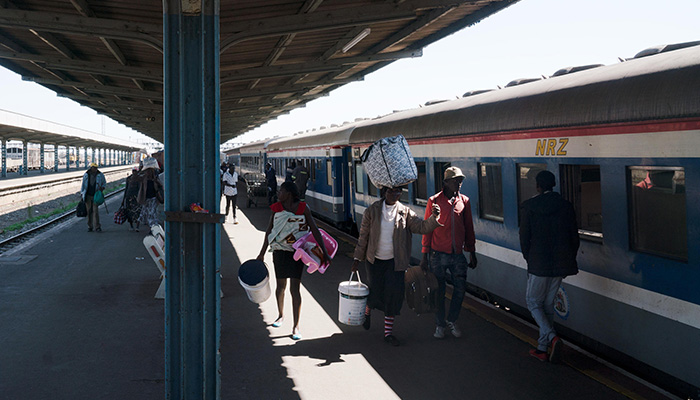NRZ posts staggering losses . . . new commuter rail service leaves company in the red
By Jeffrey Muvundusi
The National Railways of Zimbabwe (NRZ) is posting staggering losses.

Management yesterday revealed that the losses have been worsened by the recently introduced heavily-subsidised commuter train services that have left the State rail company in turmoil, with the sense of crisis pushing the administration to beg the government to consider an urgent bailout package.
NRZ general manager Lewis Mukwada said there was lack of subsidies to the State-owned passenger rail company and it is in desperate need of operating funds.
With the lines on the brink of financial collapse, management has tabled a request before Finance minister Mthuli Ncube for an emergency bailout, or the service risks running into serious problem.
Mukwada said the urgency of this was enormous. He, however, could not be drawn into revealing the exact amount that the company is losing on an annual basis.
Mukwada said the losses have been further compounded by the recent introduction of commuter trains in Bulawayo.
He said rail operator was losing money revealing the company must cut costs even as it tries to repair an aging fleet and make its trains run on time.
“When we introduced the passenger trains to Luveve, we had to use the coaches that were introduced in the 50’s 60’s, they are in a very poor state so we just selected the best and they are the ones that are running. We also want to do Emganwini and we have sent the bill to government and we are waiting for their response,” he said.
He said the introduction of commuter trains was understandable as it was part of government’s much-needed community service.
“We had discussions with the ministry of Finance and explained to them that yes, we can introduce the service at least on one route, but this is the loss or shortfall we are making.
“They said you can submit your case and we went through the ministry of Transport and demonstrated our figures and the papers are now with the ministry of Finance, so we are operating with the expectation that the ministry will consider the issue of commuter trains,” Mukwada said.
The crisis threatens to affect thousands of passengers across the city. The impending problems portend especially serious consequences for the poor in the adjacent suburbs that most heavily use the service. The commuter network links the CBD and several suburbs and carries thousands of passengers daily.
The NRZ introduced the commuter rail service last year to operate trains morning and evening through Bulawayo city.
NRZ is providing a common carrier passenger transportation along railway tracks, with scheduled service on fixed routes primarily for short-distance (local) travel between the CBD and adjacent suburbs.
The commuter rail operates two services between Bulawayo Station and Esigodweni in Cowdray Park in the morning and evening starting from Monday next week.
The commuter train has stops at Greenroofs in Cowdray Park, Luveve, Cowdray Level Crossing, Entumbane, Nguboyenja, Mpopoma and Westgate to pick up and drop off passengers.
When launched it was costing 50 cents a ride, but last week NRZ increased fares to $1, in a move widely seen as a bid to curb the worsening losses.
“Generally, throughout the world, passenger trains are loss-making entities. Government use passenger trains as one of the obligations that it has to do to the community,” Mukwada told journalists during a media reception.
“It’s like a growth point, for a growth point to take up you can’t put a tollgate specifically for that growth point, government has to put up the roads through DDF and then basic infrastructure….., so similarly with passenger trains they are all loss-making,” he said.
NRZ also has passenger trains plying Harare -Bulawayo, Harare-Mutare and Bulawayo-Vic Falls routes.
The parastatal received a timely boost last year after it received 13 locomotives, 200 wagons and 34 coaches on a lease from South African rail utility, Transnet, as part of the $400 million recapitalisation deal with the Zimbabwean government.
The NRZ general manager said despite previous promises by the government to bail out the financially-strapped rail transport company, it has all remained a pie in the sky.
“Government in 1997 said they will give NRZ a shortfall in the money they make and what they spent to make up for passenger trains but they have been in a position to do that but then it’s the burden we have to carry,” he said.
Recently, NRZ said it has recorded an increase in freight volumes since it received Interim Solution Equipment under its recapitalisation deal.
Freight movement has always remained NRZ’s major source of income.
To date, the company is, according to Mukwada, owing over $100 000 in 13 months’ salary arrears.
Operational capacity at NRZ had largely been impacted negatively by the unfavourable economic climate Zimbabwe has been reeling under for close to two decades.
During its glory days in the 1990s, the strategic logistics company used to move 18 million tonnes of freight annually but the figure has plummeted. DailyNews






